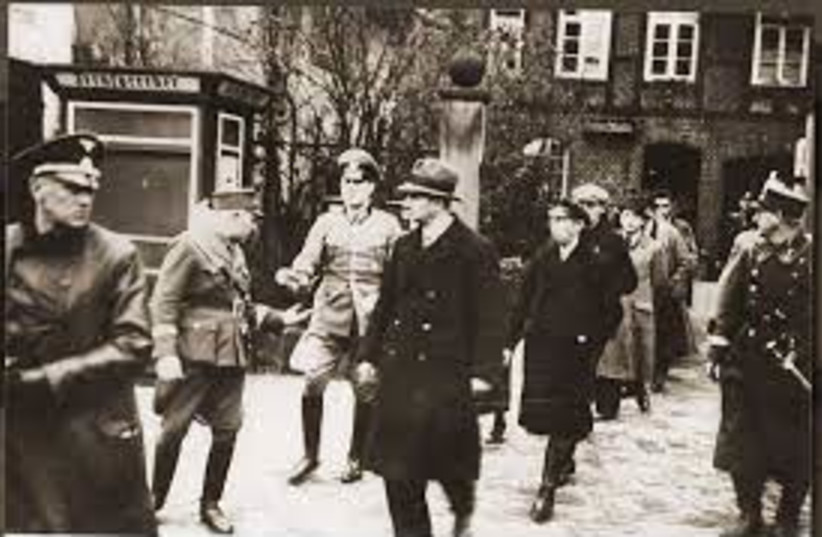Last month, we commemorated Kristallnacht, “the night of the broken glass,” which took place during November 9-10, 1938. It was the major Nazi pogrom targeting Jews, which marked the beginning of the Holocaust.
The pogrom targeted all synagogues in Germany, Austria, and the already Nazi-occupied western Czechoslovakia (the Sudetenland), which were burned down. The holy Torah scrolls were desecrated and were valuables stolen. Some 30,000 Jewish men were taken to concentration camps and thousands of Jewish homes and businesses were destroyed or damaged.
The fire brigade was there, not to douse the flames, but to cool down and protect neighboring German-owned property. Crowds of Germans stood by and watched it happen. At about 8 a.m., I arrived at my classroom, which was in the destroyed synagogue building. I saw it all.
Fast forward: Immediately following this “sign of things to come,” Jewish community leaders appealed to Jewish charitable organizations in the UK with the urgent call: “Please do something to save our children (kinder).”
Miraculously, the British government responded positively to the British Jewish leadership’s request. With the help of Jewish philanthropists, they arranged for 10,000 children to be admitted to the UK. At that time, the Nazi policy was to expel the Jews, as the “Final Solution” had yet to be formulated and implemented. The British immediately agreed to take the youngsters and the necessary arrangements were put in motion.

According to the Holocaust Encyclopedia, the first group of 198 children from a Jewish orphanage in Berlin, which was destroyed during Kristallnacht, left for England on December 1, 1938, about one month after Kristallnacht.
During the next eight months, regular transports, originating in Germany, Austria, and the Sudetenland, took place. Unfortunately, on September 1, 1939, World War II broke out and everything came to an abrupt stop. The last group of children who left Prague on September 3 were turned back and never heard from again.
By that time, about 7,500 children managed to get to England. Sadly, some 99.5% of them never saw their parents again. The reason was the cruel condition imposed by the British government, led by prime minister Neville Chamberlain, that the children must be unaccompanied. No parents!
I have vivid memories of my own departure from Germany with the Kindertransport on July 25, 1929, almost one month before the outbreak of World War II, and my arrival at London’s Liverpool Street railway terminal one day later.
The memory of Kristallnacht
The elation of having escaped the horrors and barbarity of the Nazis, and the memory of Kristallnacht, were tempered by the trauma of having to leave without my mother. My father had already been deported to Poland. I was a relatively naive, but a very street-wise 15½-year-old, quite aware of why I was leaving.
But there were 4- and 5-year-olds, and younger children, whose parents put them on the train and then stood on the platform. The children cried and thought they were being abandoned, while the parents were absolute heroes, saving their children and knowing full well that war was imminent and their own future uncertain. It is unimaginable how they felt, and then, became the victims of the Holocaust.
In 1939, Nicholas Winton also saved 669 children from Czechoslovakia, which was under Nazi occupation, and brought them to Britain. Kol Hakavod to him, but this commendable feat is unfortunately very often erroneously confused with the Kindertransport. For his efforts, he was knighted by the late queen Elizabeth II.
Last year, the March of the Living organization, best known for its annual march from Auschwitz to the Birkenau concentration camp, produced a film featuring three Kindertransport survivors. These former kinder, including myself, retraced their journey from their homes in Germany to their relocation to London, and reminisced about their experiences during this traumatic personal upheaval.
To watch the 37-minute film, go to:
www.youtube.com
The writer, who is in his 101st year, holds Guinness World Records as the world’s oldest working journalist and oldest active radio host.
